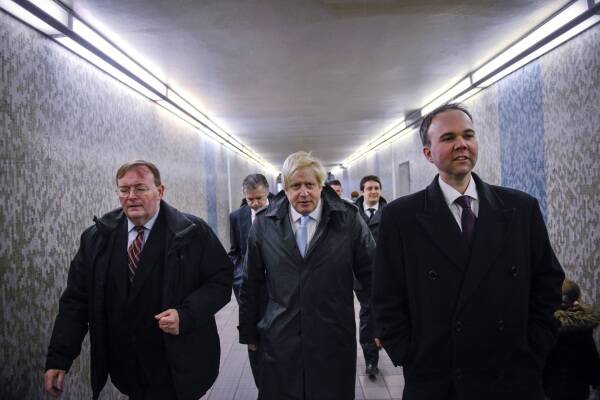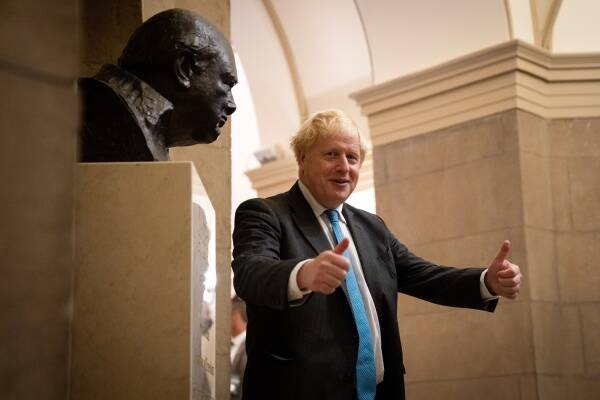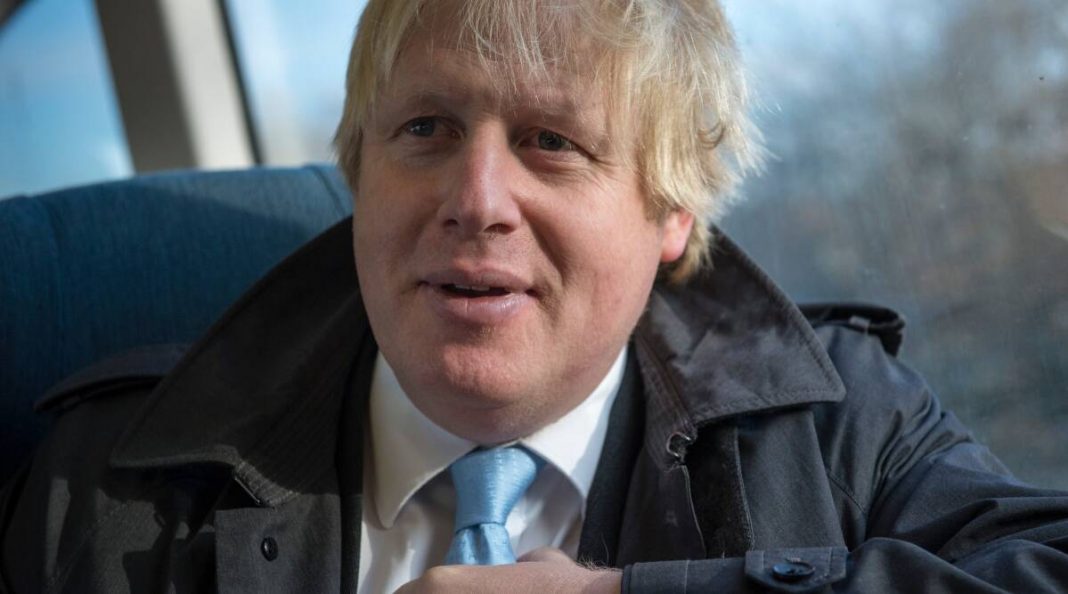On the surface, it looked like business as usual at the heart of British government Friday, a day after Boris Johnson was forced to announce he would resign as prime minister when his party turned against him over the latest in a series of embarrassing scandals.
In the morning, he sent his condolences after the shocking assassination of Japanese former prime minister Shinzo Abe. And he prepared for a weekend away at Chequers, the official country residence for generations of British prime ministers. The previous afternoon, he held a Cabinet meeting where he discussed his latest conversation with Ukraine’s beleaguered president.
But nothing ebbs faster than power. Johnson is now a lame duck prime minister presiding over what is being called a zombie government while his wounded Conservative Party is divided on whether he should stay on as a caretaker until his replacement is chosen, likely leaving him at the helm through the summer.
The Cabinet that met Thursday includes at least two colleagues who had told him to quit, as well as Suella Braverman, the attorney general. She had announced on TV on Wednesday night — while Johnson was still insisting he would remain prime minister — that she was running for his job.
And even as he carried on with his duties as a statesman, his office was forced to respond to media accusations that he might be trying to hang on as long as possible partly so he could host a fabulous wedding bash at Chequers. An aide on Friday said a new venue would be found for the party, originally planned for the estate.
Johnson has promised not to embark on any new policies while he remains in Downing Street, and few are now interested in his thinking. Instead, attention is focused on the contenders jockeying for his position.
 Boris Johnson, center, then the mayor of London, during a walkabout in the Croydon neighborhood, Jan. 17, 2013. (Andrew Testa/The New York Times)
Boris Johnson, center, then the mayor of London, during a walkabout in the Croydon neighborhood, Jan. 17, 2013. (Andrew Testa/The New York Times)
The final blow for Johnson, who had previously fended off several other scandals, was his handling of allegations of sexual impropriety against Chris Pincher, a high-ranking Tory lawmaker, and Downing Street’s shifting answers about what the prime minister knew and when he knew it.
Johnson desperately fought to keep his job despite dozens of resignations from his government Wednesday. As the exodus of government ministers continued into Thursday morning, Johnson was ultimately left with no choice but to announce that his often disorderly time in Downing Street, marked by frequent periods of crisis, was drawing to a close.
One British political question was resolved Friday when police decided not to fine the leader of the opposition Labour Party, Keir Starmer, over allegations that he violated lockdown restrictions. Starmer, a former chief prosecutor, had promised to resign if he was found to have broken the law, and that would have meant leadership contests in both of Britain’s main political parties.
Starmer is in the clear, but the race among Conservatives to replace Johnson is underway.
On Friday, Tom Tugendhat, a centrist lawmaker, said that he would seek the party leadership. He was joined later by Rishi Sunak, the former chancellor of the Exchequer, whose resignation and letter calling for Johnson to quit Wednesday helped precipitate his downfall.
The list of would-be successors to Johnson will probably grow in the coming days, with several high-profile figures expected to declare their interest.
They include the foreign secretary, Liz Truss; the chancellor of the Exchequer, Nadhim Zahawi; and two former health secretaries, Sajid Javid and Jeremy Hunt. Steve Baker, a former minister and Brexit hard-liner, has also suggested that he will join the race.
The absence of a clear favorite could encourage other senior Conservative politicians to try their chances. They could include the defense secretary, Ben Wallace; the home secretary, Priti Patel; the transport secretary, Grant Shapps; and Michael Gove, who was a member of the Cabinet as recently as Wednesday.
 Johnson said on Thursday, July 7, 2022, that he would step down as prime minister, after a wholesale rebellion of his cabinet, a wave of government resignations and a devastating loss of party support prompted by his handling of the partyÕs latest sex-and-bullying scandal. (Sarahbeth Maney/The New York Times)
Johnson said on Thursday, July 7, 2022, that he would step down as prime minister, after a wholesale rebellion of his cabinet, a wave of government resignations and a devastating loss of party support prompted by his handling of the partyÕs latest sex-and-bullying scandal. (Sarahbeth Maney/The New York Times)
Gove is a friend and rival of Johnson’s from their days at Oxford University; they were among the most prominent backers of Brexit, but Gove was fired Wednesday night after urging the prime minister to quit.
While those potential candidates battle it out, Johnson has resisted calls to step aside immediately, an idea backed by, among others, a former Conservative prime minister, John Major. But after promising Thursday to quit, Johnson persuaded enough senior lawmakers to help him form a stopgap Cabinet, allowing him to continue in an interim capacity.
When Johnson’s predecessor, Theresa May, agreed to step down, there was little debate about her decision to continue as a caretaker until her successor was chosen.
The circumstances surrounding Johnson’s departure are very different, though, because he was ousted under a cloud of scandal that raised serious questions about his honesty and integrity. His refusal to step aside immediately has infuriated the Labour Party, which has threatened to demand a no-confidence vote in Parliament against the government.
“How many more months of chaos must we endure?” wrote Angela Rayner, the deputy leader for Labour, in an opinion article in the Daily Express.
“Enough is enough,” she added. “The public is fed up with the lies, lawbreaking and sleaze.”
But for the Conservatives, voting for a no-confidence motion would run counter to their interests: Britain would be plunged into a general election at a time when the party is struggling in the polls. As such, and with Conservative lawmakers holding easily the biggest number of seats in Parliament, that scenario seems implausible.
The length of time that Johnson remains in Downing Street will most likely be determined by the Conservative party leadership, which on Monday will set a timetable for choosing a successor. That sets the stage for Conservative lawmakers to select their two top candidates, with the ultimate choice being made by the approximately 200,000 dues-paying members of the party.
Although the list of candidates could reach double figures, lawmakers are expected to narrow down the field to two before the summer recess, scheduled for July 21.
